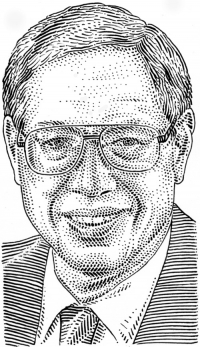- Economics
- Law & Policy
- Regulation & Property Rights
This past week, in McCutcheon v Federal Election Commission, a bitterly divided United States Supreme Court struck down yet another portion of the Bipartisan Campaign Reform Act of 2002 (BCRA) this time, the aggregate limit of $123,200 for contributions by any one individual to all candidates and non-candidate committees in any two-year election cycle. That BCRA provision blocked Shaun McCutcheon from making $1,776 contributions to twelve candidates he favored, because he had already contributed his maximum amount of $33,088 to sixteen candidates for federal office. He challenged the limitation as an abridgement of his constitutional right of freedom of speech, for which he found a receptive audience in five members of the Supreme Court.
The four-member plurality (Chief Justice Roberts, Justices Scalia, Kennedy, and Alito), struck down that aggregate limit, while leaving the limitation on individual contributions untouched, on the grounds that the aggregate limit was not reasonably tailored to prevent the risk of corruption in political elections, which the Court narrowly defined to cover only quid for pro corruption. The four member plurality was joined by Justice Clarence Thomas, who has long insisted that all contribution limits run afoul of the First Amendment.

Illustration by Barbara Kelley
On the other side, Justice Stephen Breyer, speaking for himself and Justices Ginsburg, Sotomayor, and Kagan, stoutly defended the law as consistent with the basic tenets of popular democracy. Patching together quotations from notable historical luminaries, he insisted that these campaign contribution restrictions were desperately needed to preserve to a well-functioning “‘marketplace of ideas’ [that] seeks to form a public opinion that can and will influence elected representatives.” In his view, these limits secure the "maintenance of the opportunity for free political discussion to the end that government may be responsive to the will of the people.” In this context, the object of the First Amendment is to “facilitate a chain of communication between the people, and those, to whom they have committed the exercise of the powers of government.”
At root, Justice Breyer fears that stripping away these aggregate limits will allow rich people to flood the marketplace of ideas, so as to drown out the voices of ordinary people in political elections—despite the increasing ability of all people to make their views known at low-to no-cost through social media devices like Facebook and Twitter.
As I wrote about the Supreme Court’s 2010 decision in Citizens United v. FEC, I have developed a strong aversion to the BCRA on the ground that its ill-advised limitations on campaign contributions will only aggravate the distortions in the political market. It is therefore important to analyze McCutcheon not only as an exercise in First Amendment logic, but also within the context of the larger political economy framework that I think Justice Breyer’s opinion profoundly misunderstands.
Property and Liberty in Tandem
The basic principles of American constitutional law link closely the protection of property and liberty. That point is made powerfully by the text of the Due Process Clause that specifies “no person shall be deprived of life, liberty or property, without due process of law.” The close connection here is not limited to one constitutional amendment, but undergirds our entire constitutional edifice.
At the time of the Founding, political theory sharply distinguished between the democratic and republican forms of government, defending the latter and opposing the former. In a democratic society, popular majorities could have their way on any political issues. In a constitutional republic, the political organs should be organized so that they only deal, as the Latin suggests, with the affairs of the public at large, and not with the private business and social arrangements of its citizens.
In order to limit government power, Republican theory supports the complex array of voting structures and separation of powers designed largely to guard against the risk of confiscation by an alert and restive political group. It is for this reason that the Constitution provides in Article IV, Section 4 that “The United States shall guarantee to every State in this Union a Republican Form of Government.”
Under the Republican worldview, the common phrase “the people” carries two very different meanings. In one sense, as in the Fourth Amendment, the Constitution protects the rights of the people to be free of “unreasonable searches and seizures.” Each citizen is protected against the power of the government to seize his property and search his premises on a whim. But the term “people” in the preamble’s “We the people” carries with it a different and, at times, more ominous interpretation. That phrase now means that we the people acting together can impose our collective will on the dissenters within our midst.
When Justice Breyer refers to his desire to make the government “responsive to the will of the people,” he does not carefully distinguish between these two senses of “people.” To the contrary, he repeatedly posits “the public interest” in “collective speech,” which makes it appear as if there were no independent constitutional constraints on the exercise of the collective will in matters of current political importance. On this view, the purpose of politics is just to allow political majorities to act in the name of the people, no matter what the consequences of their action. Really?
Majoritarian Vices
That majoritarian approach is consistent with the strong and misguided position that Justice Breyer took in his 2005 book Active Liberty: Interpreting Our Democratic Constitution, whose central thesis is that “the Constitution’s primary role is to preserve and encourage . . . citizen participation in shaping government and its laws.” It is rare for a book to take such a wrong turn; it pays scant attention to the constitutional protection for individual rights and thus reveals no appreciation of the major risk of expropriation of wealth and opportunities through collective political action. Unfortunately, it is fair to say that no set of structural protections, at either the state or the federal level, is sufficient to guard against this risk, which increases exponentially when groups can instantly mobilize to target those vulnerable groups and individuals who do not toe the line on some critical political initiative, as with the ill-conceived contraceptive mandate of Obamacare.
The Founders added the Bill of Rights to the original Constitution to guard against expropriation and oppression. Unfortunately, the protections of property and religious freedom have been whittled away by a string of judicial decisions that too often insist that any “conceivable” justification for government is sufficient to override explicit constitutional principles.
The political landscape would be completely different today if political majorities were not in a position to regulate both property and religious liberty more or less as they see fit. At this point, a large set of individual rights would not be regarded as the affairs of government, which could not, for example, dictate the various terms that employers must offer to their employees under minimum wage and overtime laws, or require them to negotiate collective bargaining agreements with recognized unions against their will.
These decisions have often been derided by the modern defenders of big government, who, consistent with their own views, have strongly denounced the Court’s decision in McCutcheon. Thus my NYU colleague Burt Neuborne criticized the Roberts opinion in a post entitled Welcome to Oligarchs United,which in my view gets the situation exactly backwards. Neuborne is sharply critical of McCutcheon, which he thinks will entrench the position of the rich against the rest of the population. Empirically, that proposition is overwrought, given that wealthy individuals hardly present a uniform front in national politics. But his errors, I think, go deeper because of the underlying vision of what counts as good and bad constitutional law. More concretely, it is just wrong for Neuborne to equate the Supreme Court that “protected slavery” and “endorsed racial segregation, denied equality to women, and jailed people for their thoughts and associations,” with the Supreme Court that “blocked minimum-wage and maximum-hour legislation.”
Quite simply, no intelligible theory of political economy lumps the protection of contractual freedom into the category of statist and oppressive restrictions on individual liberty. Indeed, it is just at this point that the case in favor of the campaign contribution caps collapses. In a society that has strong protections for property rights, supposed oligarchs have no reason to enter big-time into political activity because their liberties and property would already be amply protected against confiscation by collective action. The simple truth here is that public deliberation is always improved when these side constraints against government action are respected for candidates all across the political spectrum. The purpose, for example, of the “just compensation” requirements in the Takings Clause is to make sure that political majorities take into account the losses of those individuals whose rights they restrict by onerous rent control, zoning, and landmark preservation laws. By forcing the costs of these programs onto the public budget, government officials and citizens must determine whether the public benefits acquired through regulation are worth the additional taxes that must be raised to keep these constraints in place. The answer is that they often are not.
The point matters in these political cases because it is highly doubtful that so-called oligarchs would make political investments if they knew that they were immune from the risk of confiscation through thinly disguised schemes of regulation and taxation, especially since these same rules would prevent them from seeking subsidies of their own. But right now, with these protections shattered, the dynamic changes on both sides of the great political divide.
As matters now stand, most of the legislation before Congress and the states represents efforts on the part of the progressive movement to retain its chokehold on employment relations and land use, to funnel huge sums of money in favor of subsidies to inefficient forms of wind and solar energy, and to increase the burdens of taxation of the rich in the name of greater income equality. And there is no doubt that these groups can and will take advantage of the relaxation of the political restraints that are placed on their activity.
In this environment, the supposed oligarchs are on the defensive. In the main, unlike unions, they are not seeking massive subsidies. They are trying to resist actions that restrict their own basic property and contract rights. Indeed, there is no question who is winning the debate today, as government action intrudes itself ever more into the life of the public. If I were a progressive, I would surely support all the financial limitations in the BCRA on the ground that they are likely in practice to bite harder on individuals who cannot rely on an army of unpaid foot soldiers to advance their political objectives and are thus forced to enter the political lists to protect rights that should be theirs as a matter of basic constitutional principle.
Back to Freedom of Speech
In light of the current political climate, it makes no sense to defend these various statutory limitations on political activity in the face of an explicit constitutional guarantee of freedom of speech, which presumptively covers individuals who contribute money to candidates who agree with their position. It is clear that this constitutional protection does not extend to bribery or extortion. But the constant effort to broaden the definition of “corruption” so that it covers virtually all form of political activity has the same corrosive effect on the freedom of speech that is found in the fanciful communitarian objectives of land use and labor market regulation that has managed to gut traditional protections of economic liberties and private property.
Justice Breyer inveighs mightily about how various individuals might use clever artifices to “circumvent” legitimate constitutional restrictions, but he ignores the simple point that in dealing with regulations on political speech, the burden remains on the government to show why specific regulations are necessary to deal with demonstrated specific abuses, not with unsubstantiated fears of abuse. It turns the First Amendment upside down to impose any restrictive regulations before demonstrating a breakdown in political processes that well-tailored laws can meaningfully address.
Justice Breyer is barking up the wrong constitutional tree. The real problem is not with the current level of political participation. It is with the dangerous constitutional dynamic whereby the weak constitutional protections of liberty and property make current politics as divisive, bitter, and uninformed as it has become.
















